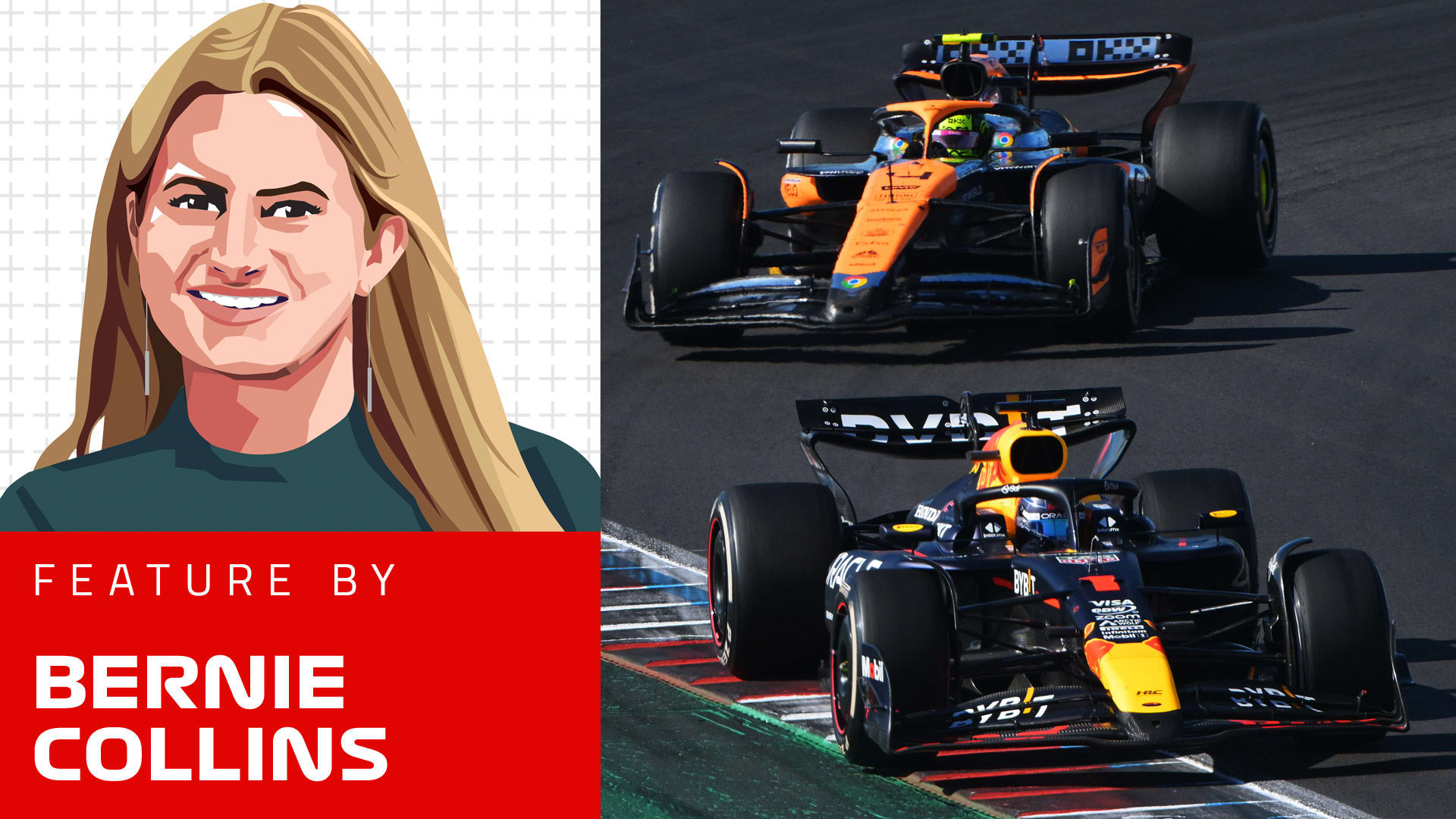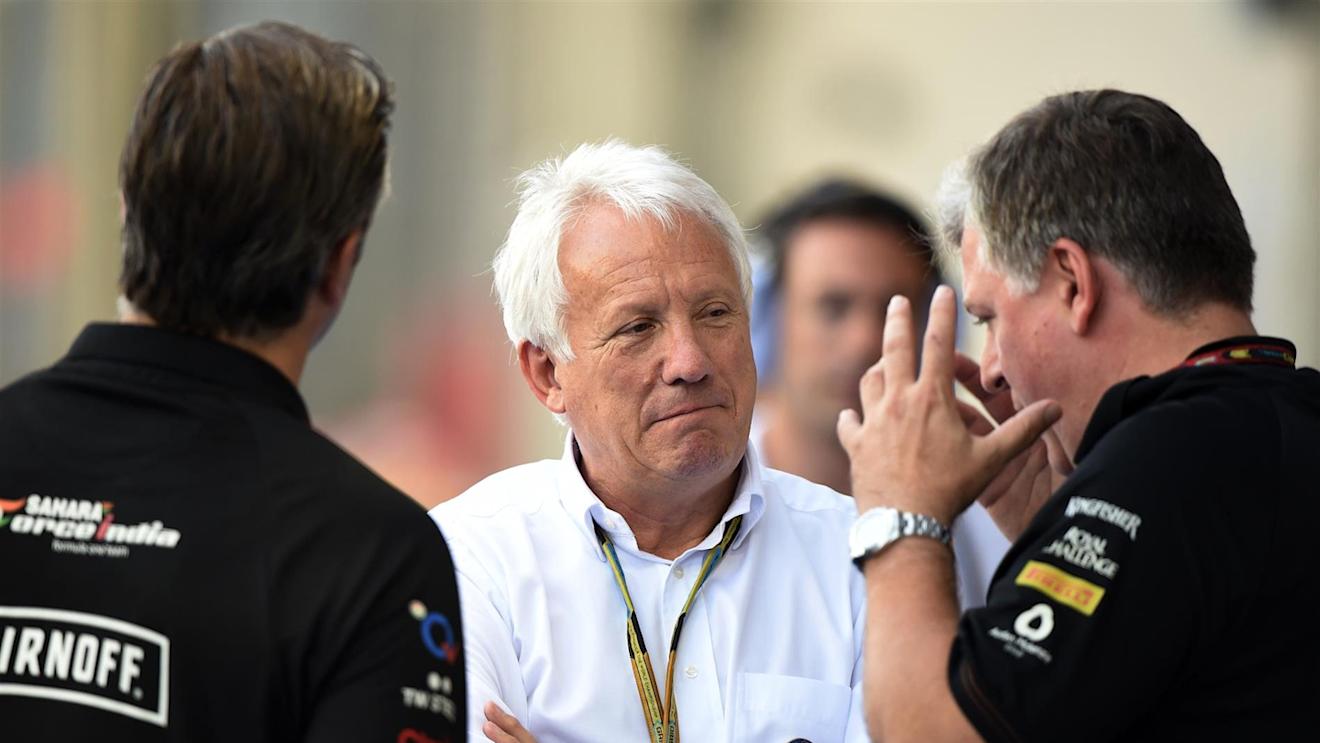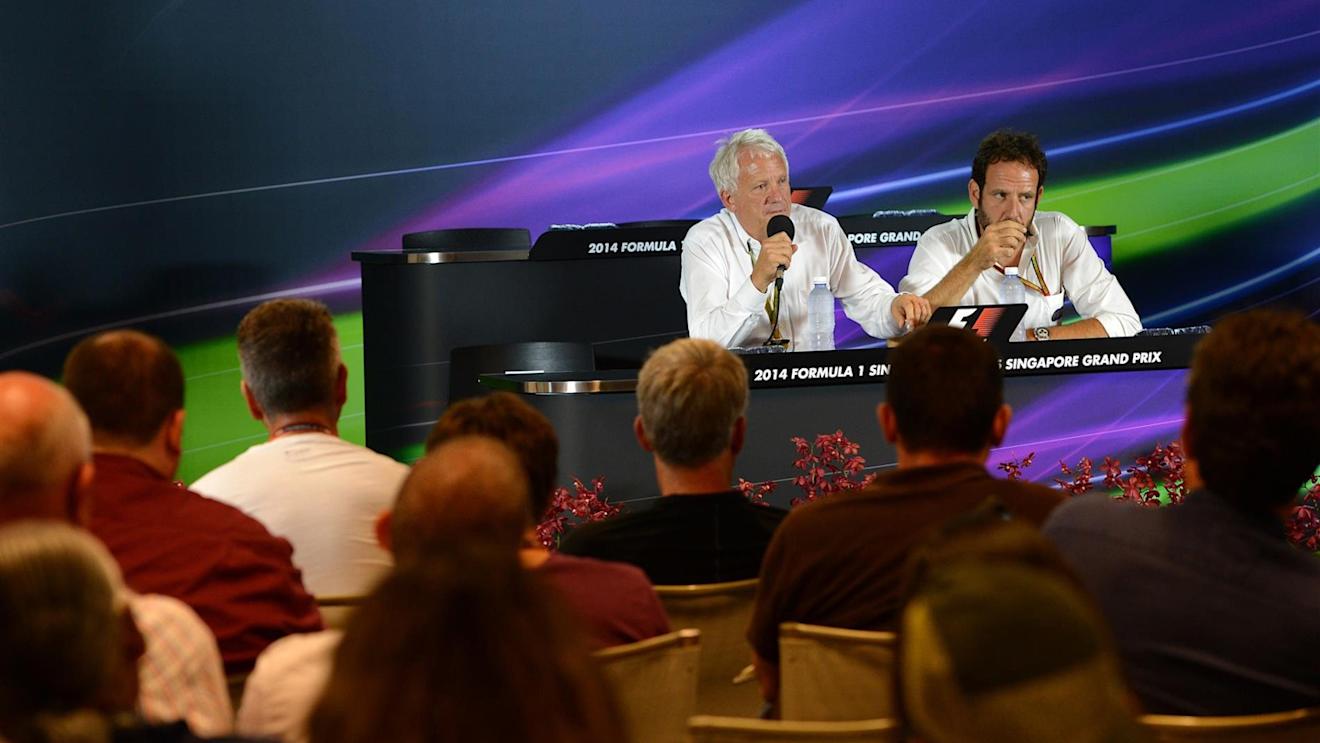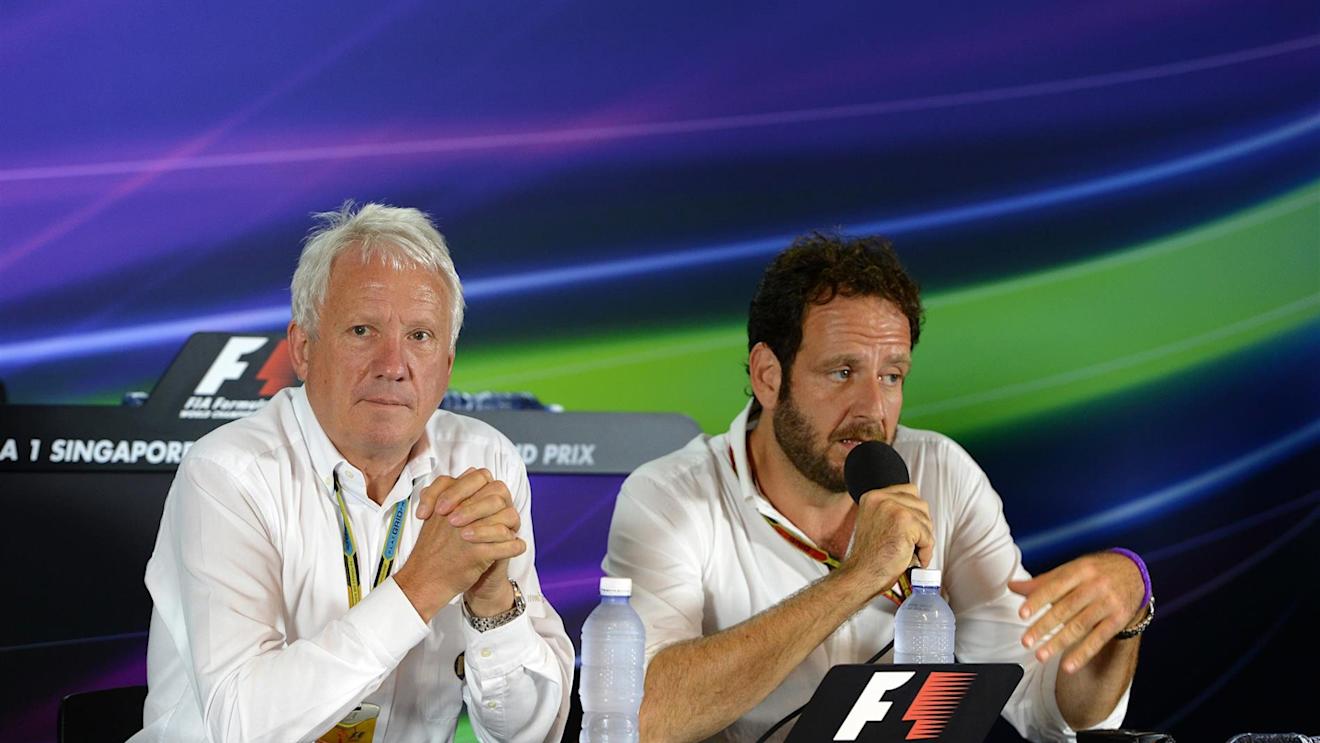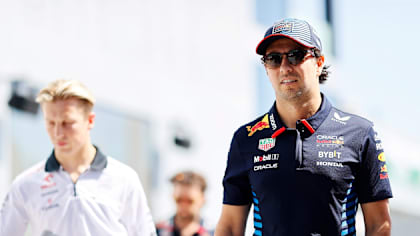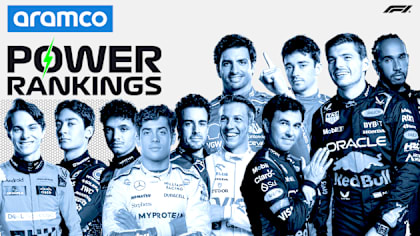1 / 3
News
FIA press conference with Charlie Whiting
Friday saw the introduction of new restrictions on team-to-car radio messages designed to ensure that drivers are driving 'alone and unaided'. The FIA’s Formula One race director Charlie Whiting spoke to the media in Singapore about the changes...
QUESTIONS FROM THE FLOOR
Q: (Marc Surer - Sky Germany) The first session was quite confusing. What is driving advice? What is technical advice? What is allowed and what not?
Charlie Whiting: First of all, have you seen the Technical Directive that I sent?
MS: No.
CW: Well then you're at a bit of a disadvantage! On that particularly question Marc, it's quite straightforward really. If a team informs a driver to change his brake balance, that's absolutely fine, provided it's not for a specific part of the circuit. So, in other words, one click forward for Turn 5 and two clicks backward for Turn 10, those are the sort of things we consider to be driver coaching, assisting the driver, whereas, a global change to the brake balance, or any other similar parameter on the car, would be for overall performance, which is fine. It's just the driver coaching element of it that we want to stop first of all.
Q: (Jonathan Noble - Autosport) Can you say what prompted the decision to impose this radio clampdown for this weekend? What were the specific things that were discussed with the teams yesterday that made you realise you couldn't go as far as you'd wished to in the build-up to this weekend?
CW: What prompted it in the first place? A culmination of things really. It was becoming apparent that more and more was being done for the drivers and quite simply that is at odds with Article 20.1 of the regulations. We felt that this should extend to both car performance and driver-related parameters but when one looks into it in more detail it became quite clear that some teams would be at a serious disadvantage compared to others, not just in their know-how or in their ability to react in the short term, but also with hardware choices that were made a year ago. I think you're familiar with the two types of dashboard that are available to the teams. One will simply show a great deal more than the other. In the interests of fairness, we felt that with hindsight it would be better to introduce it in two stages and that's what we've done now.
Q: (Ian Parkes - Press Association) Why did you do it now though? Why didn't you wait until the start of the next season? Wouldn't that have been far easier than introducing this with six races remaining?
CW: Yes, it would have been easier, but I think when it comes to enforcing a rule then things have to be done. It's as simple as that. Yes, of course it would have been easier but I think if you see or hear something that you uncomfortable with, with regard to whether it conforms to the rules or not, you have to do something about it. That's our job.
Q: (Dieter Rencken - Racing Lines) Charlie, following on from what John asked, who initially instigated this? Was it an FIA or a commercial rights issue? Because we believe that the commercial rights holder said he had something to do with it as well.
CW: It was an issue that came up in the Strategy Group meeting in Monza.
DR: From the commercial rights holder?
CW: I think it's not for me to say what goes on in those meetings. It was something that emerged from that meeting in Monza.
Q: (Mathias Brunner - Speedweek.com) Charlie, did you hear anything in free practice one which was questionable to you, (a), and (b) what would the possible fine be if a team does something wrong?
CW: First of all, no, we didn't hear anything that was remotely questionable. Teams were playing it very, very carefully, I think because they didn't want to step over the mark. I think it's not for me to actually say what the penalty might be because it's a matter for the stewards of course. All I would do is report to the stewards a possible contravention of Article 20.1 and they would then decide what the penalty would be. I think it would have to be a sporting penalty rather than a monetary one, however. I would imagine it would be something along those lines. If it happened in a race I think it might be - I emphasise might be - a five-second time penalty for example. If it happened in practice it might be a grid position or something. But I think a sporting penalty as opposed to a monetary one.
Q: (Jonathan McEvoy - Daily Mail) Might it be that we spend a long time after the race resolving these things? Is that a danger you're worried about?
CW: No. We listen to these things in real time and if we hear anything… Don't forget that teams listen to each other intently. We'll hear, don't worry, and we won't have to trawl through hours of radio conversation to find out if there's anything wrong.
JM: Just for example, if six of these land on the stewards' desk at one go that there might be backlog as they go through them.
CW: Well, unfortunately that would always be the case if there were any six enquiries that the stewards had to look into but it's rare, though, I think you'll admit.
Q: (Ben Anderson - Autosport) Is there a plan to simplify regulating radio communication going forward for next season and maybe go further, rather than having this complicated ‘some things are allowed, some things aren't'?
CW: The plan is to make it more far reaching, to take in the technical elements of it as well, the technical assistance that the driver is getting about the performance of the car as well. It will inevitable become more complex but unfortunately I think that is how the sport is. I think it's going to be very hard to make it simpler, unless of course one was to remove radios from the car, for example, but I think that might not be very well received.
Q: (David Croft - Sky Sport UK) Couple of points Charlie: 22 drivers, 11 teams, how many people have you got monitoring the radio traffic during each session?
CW: In total, probably about eight, but it's quite straightforward to listen to three or four. They don't normally all talk at the same time but it's being recorded, so if we were to miss something we could easily go back and find it very quickly.
Q: (David Croft - Sky Sport UK) And based on what fans were saying to us this morning: practice sessions are practice sessions. Why do you have to rigorously enforce this during what is a training session for qualifying and the race?
CW: Well, we believe that a driver should drive the car alone and unaided. He shouldn't be told he's going a bit too deep into this corner or should take a tighter apex on that corner. It's for him to decide, not for his team to tell him how he is comparing with his team mate for example.
Q: (Anne Giuntini - l'Equipe) Could it be imaginable to have modern Formula One without radio at all?
CW: I could imagine it, but I think the teams might find it unpalatable, shall we say?
Q: (Heiko Wasser - RTL TV) So for TV, at the moment, as I understand, we don't get each and every radio so far. It's taped and we don't get everything. Now, in the future, it can happen that somebody gets a penalty for a radio that we didn't hear on the television? Or will it be making sure each and everything will be broadcast so that the audience worldwide can follow that something went wrong?
CW: First of all, it's impossible for you to hear everything that's said, that's quite clear. The television broadcasters decide what to broadcast. I suspect that if a team was accused of saying something that it shouldn't have been saying, that would be available to the broadcasters in the fullness of time. I'm sure you would hear that, but whether you'd hear it live is, I think, a matter of chance more than anything else.
Q: (Daniel Johnson - Daily Telegraph) With phrases like 'driver technique in general', is there not a danger that we'll just get into a situation where teams are making complaints and counter-complaints, because that seems like it could cover a whole range of things and could be quite easily argued one way or the other?
CW: You've obviously seen the list. That's at the bottom of the list and the idea is that that should capture anything that's not actually listed. I think it's a fairly exhaustive list, so I think it's quite unlikely. And teams have a tendency to make sure that they are absolutely clear on things. So, if they look at the list and think 'I wonder if this driving technique in general', they would probably ask before they decided to use it, so I don't envisage any big issues over that. It's a kind of a catch-all, just in case.
Q: (James Allen - Financial Times) When you last gave us one of these briefings in Silverstone, you talked about complication and you've mentioned complication again. Is there not a risk that this whole debate has once again added something that is very complicated, with a long list of very complicated things, when it's actually a question of perception to the public. Wouldn't it have easier to just give the world feed TV director a list of radio messages that would suitable to air to the public, because the public doesn't know all the other coaching that goes on between races and all the other things that happen between teams and drivers, so wouldn't that have been a much more simple solution?
CW: Yes, it would have been simple, well, simpler. But the fact of the matter is when the driver is on the track he should be driving the car himself. That's the fundamental essence of the regulation in question isn't it really? Whether he receives coaching outside an event, he's perfectly at liberty to do that of course. But once he's out on that track, he should be doing it himself. That's the reason for the rule and that's the reason why we believe we have to enforce it. It is a complicated sport and this is an area that hadn't really come into the spotlight previously, but it just shows that every single area in Formula One is complex. There are very few simple ones. That's the nature of the beast, as we say.
Q: (Andrew Benson - BBC) Charlie, I have seen the directive that you sent out but radio beeps for gear changes aren't mentioned on that. What side of the line do they fit on?
CW: It's the same as a rev counter. That's all. Instead of looking at a rev counter, you can hear one and that's not a driver aid as far as we're concerned.
Q: (Ian Parkes - Press Association) Charlie, we obviously have Article 20.1 but we're constantly being told that F1, at the end of the day, is a team sport. While we appreciate that drivers are out there on the track, why is there any need to have article 20.1 in the first place?
CW: Well, it's been there for, I think, over 20 years and it was originally there to capture things like traction control, as you probably know. It is also a safeguard against any other driver aid which hadn't been thought of at the time and it has been used a number of time in its lifetime. And this is just one of those times, I believe. Things had got, I believe... the teams have become so sophisticated at being able to analyse exactly what a driver is doing on the track and be able to compare it to other cars - more often than not their team mate - and to be able to give that driver that information so that he can then drive the car differently is fundamentally incorrect in our view.
Q: (Michael Schmidt - Auto, Motor und Sport) Is the radio ban, as it planned for next year - is it maybe a first step to ban telemetry? Because if telemetry was banned the whole radio discussion probably would be finished, because if the teams don't know in what condition the car is, then it doesn't make sense to coach the driver or to tell him what's going on.
CW: No, it's not planned as a step in that direction at all. In fact, it's not been discussed at all. This is purely to do with the application of article 20.1 at this stage.
Q: (Abhishek Takle - Miday) Charlie, you mentioned that coded messages are obviously banned but then how do you police that? Because there could be prearranged coded messages to get around the ban on coded messages as well. It's hard to police isn't it?
CW: Yes, I agree with you. It won't be straightforward. We will have a little bit of time to think about that because the list that the teams have been given today is quite straightforward, whereas I think if you have a more complex, longer, more technical list, there will be greater opportunities for that sort of thing. It was put to me yesterday, for example, that if something like oil transfer is allowed as a message it could be coded in such a way that oil transfer when told to a driver in Turn 1 means something different to if it's told to them in Turn 10. It's going to be a little difficult but I'm fairly confident we can get over that one, with enough time.
Q: (David Croft - Sky Sport) Will that be the end of 'hammer time'?
CW: You never know.
DC: Is hammer time allowed? Is that a coded message?
CW: I think that's push hard isn't it.
DC: But surely it requires the adjustment of settings?
CW: To be discussed. That's not for this current crop of rules but I think now we have a little bit more time we can discuss these things with the teams and hammer time might come into it!
YOU MIGHT ALSO LIKE
Feature ANALYSIS: Perez had a contract for 2025 – so why has his Red Bull journey come to an end now, and who will replace him?
Feature POWER RANKINGS: Where do the drivers rank in the final leaderboard after a rollercoaster 2024 season?
News Pourchaire and Maloney set to leave Sauber Academy
Feature REVEALED: The F1 team bosses choose their top 10 drivers of 2024
